Most fans of fantasy and science-fiction literature are familiar with the concept of alternate history—tales that spring from such speculations as “What if the Confederacy had won the Civil War?” or “What if the Roman Empire had never fallen?” and so forth—but less well known is the niche of secret history (sometimes referred to as “shadow” history).
Unlike their cousins of alternate history, tales of secret history are designed to mesh with reality and history as we think we know it. Rather than posit changes to major events of the past, stories in the secret history subgenre speculate what might have happened behind the scenes, or in the shadows, of the past or present that we all take for granted.
Authors of secret history have to know how to add details to reality without contradicting it; they must be able to build conflict and drama within the context of recorded events without running afoul of history’s myriad tiny details. It is a fine line to walk.
There have been many great tales of secret history, in both fantasy and science fiction. The list that follows is by no means an exhaustive one. That said, here are five works of secret history that I’ve enjoyed. I look forward to learning about other readers’ favorites in the comments.
Declare by Tim Powers
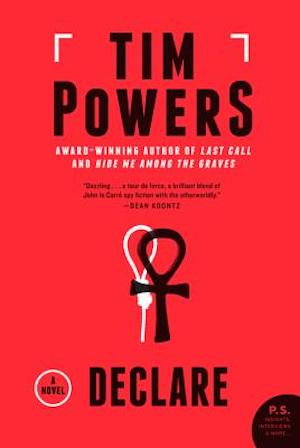
Powers, who has authored several works that qualify as secret histories, earned several major awards and nominations for his epic novel of Cold War superpowers wielding supernatural forces as weapons. The story unfolds in a non-linear fashion between the 1940s and the 1960s, and it focuses on a struggle between agents of the United Kingdom and the U.S.S.R. Among its many compelling elements are mysterious, seemingly immortal entities living atop Mount Ararat; a deity that feeds on human misfortune in return for protecting Russia from foreign invasion, as part of the rationale for the Soviet gulag system; and a deep historical perspective that traces the roots of this magical struggle all the way back to the 19th-century contests of the British and Russian empires to control the people and resources of Central Asia.
Star Trek: The Eugenics Wars, Vol. 1 by Greg Cox
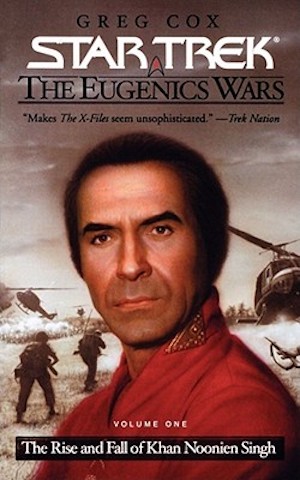
One of the key skills of a media tie-in writer is the ability to fit new narratives into tight spaces between the known events of a series’ canon. One of the best examples of this art is found in Star Trek: The Eugenics Wars, Vol. 1 — The Rise and Fall of Khan Noonien Singh. Crafted as the secret history of Khan Noonien Singh on Earth through the end of his rule in the 1990s, this re-imagining of real history seeks to explain how Khan’s reign could have been part of our own history, even though none of us seem to recall him being the absolute ruler of more than a quarter of the world’s people. (Hint: It might have something to do with intervention by an Aegis agent named Gary Seven. But you didn’t hear that from me.)
The Proteus Operation by James P. Hogan
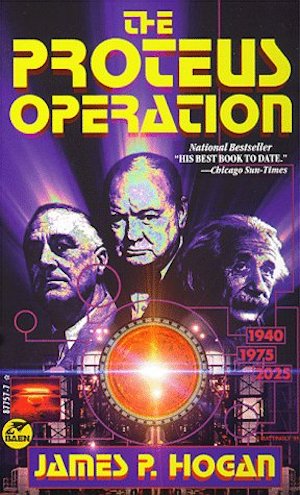
The most closely guarded secret of World War II wasn’t the D-Day landing—it’s the fact that the Allies lost the war the first time they fought it, and the Nazis seized control over most of the world. The only people who know this dark and chilling truth are Prime Minister Winston Churchill and President Franklin Delano Roosevelt…and the handful of time-travelers who have risked everything to journey back to 1939 to warn the Allies about where, when, and how they went wrong. Will Roosevelt and Churchill believe these strangers who claim to be from the future? Or are they doomed to repeat the greatest tragedy in history?
The Time Patrol series by Poul Anderson
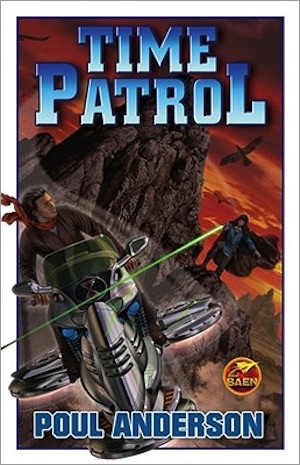
This book is a collection of several previously published works: one short story, five novelettes, three novellas, and a short novel, all featuring Anderson’s heroes of the Time Patrol. Its chief mission is to prevent others from meddling with the past. Such tasks are often heartbreaking, because humanity’s history is steeped in cruelty and suffering. While the patrol’s agents often sympathize with those who wish to mitigate the effects of evil, they can’t allow that to happen. My favorite of these tales is the novella “The Sorrow of Odin the Goth,” in which Carl Farness, a Time Patrol historian, tries to study the 4th-century Goths only to become accidentally revered as a deity and give rise to the myth of Odin/Wodan—a fate that leads to a tragic result for the ancient folk Farness has befriended and come to care about.
The Rivers of London series by Ben Aaronovitch
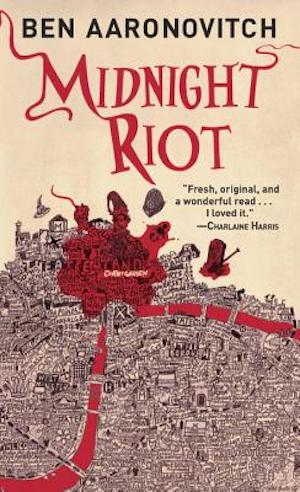
This enormously popular series of contemporary fantasy detective thrillers was built upon a firm foundation of secret history. Its reconceptions of the past include the idea that Sir Isaac Newton, in addition to being a brilliant scientist, was also secretly a powerful wizard who codified the principles on which magic has been practiced ever since. It posits that Britain, the United States, the Soviet Union, and Nazi Germany all fielded wizard-warriors during World War II, and that magic has been an essential component of warfare throughout the centuries, from the Colonial era of America through the U.S.-Iraq war as recently as 2009. All of this, however, serves merely as background for the mysterious adventures of Peter Grant, a detective (and apprentice wizard) with the secret supernatural-events division of the Metropolitan Police Service in London. The series, which began as novels, now includes original graphic novels, and is still going strong.
The Outlander series by Diana Gabaldon
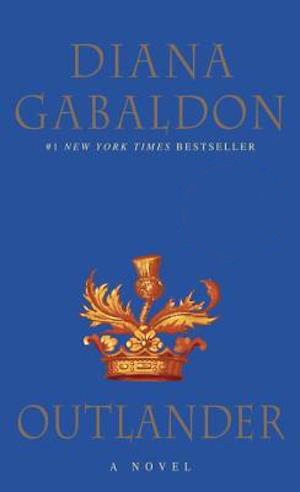
Gabaldon’s massively popular, #1 New York Times bestselling series (now a hit television series from Starz) blends historical fiction, historical non-fiction, science fiction, fantasy, and romance. It follows a married English nurse named Claire Randall, who, in 1946, by way of a ring of enchanted stones (known as a henge) in the Scottish Highlands, is transported back to the 18th century. There she is forced to flee her husband’s sadistic lookalike ancestor and seek sanctuary with a clan of highland Scots—the price of which is her marriage to one of them, a strapping fellow named Jamie Fraser. Torn between her love for Jamie and for Frank, the husband she left in 1946, Claire must navigate the terra incognita of the past—and resist the temptation to alter the course of history, even when such restraint puts those she loves in mortal danger.
 David Mack is the multiple award-winning and New York Times bestselling author of more than thirty-six novels of science fiction, fantasy, and adventure. The Shadow Commission, his new novel of dark fantasy mixed with secret history, set in the week after the assassination of President Kennedy, is available now from Tor Books.
David Mack is the multiple award-winning and New York Times bestselling author of more than thirty-six novels of science fiction, fantasy, and adventure. The Shadow Commission, his new novel of dark fantasy mixed with secret history, set in the week after the assassination of President Kennedy, is available now from Tor Books.










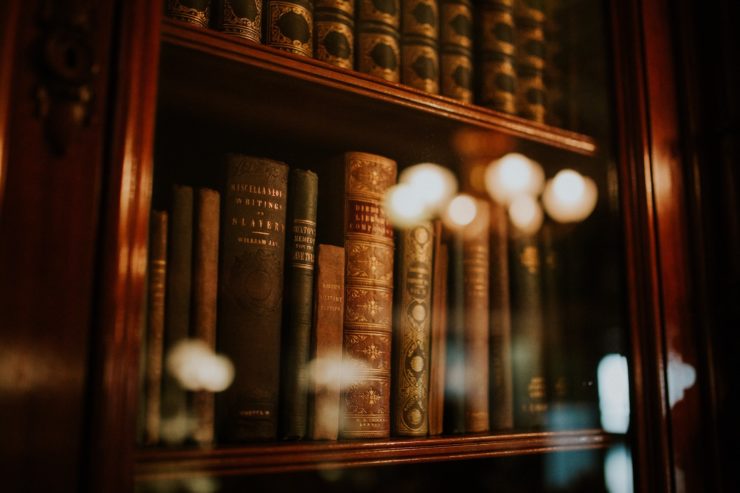
Heading more toward horror than fantasy, don’t forget F Paul Wilson’s “Secret History” books, centered on the Repairman Jack stories (starting with The Tomb), and the six-book Adversary Cycle: The Keep (ignore the movie), The Touch, The Tomb (same one), Reborn, Reprisal, Nightworld.
One of my favorites in this sub-genre is In the Country of the Blind by Michael Flynn. Wonderful book!
You know, I don’t think Outlander actually counts as secret history. It’s just a series of historical novels. The fact that the characters witness historical events doesn’t make them a secret history. War and Peace isn’t a secret history because Andrei Bolkonsky fights at Borodino.
Also:
Six Books of Truly Epic Secret History
meet
I adore the Rivers of London series, but I wouldn’t actually put them in this category; you can basically ignore all of the recent historical information and the books wouldn’t change noticeably.
Yeah, agreed – there’s no “this is the real reason why this happened”, and there are some major events in the books that definitely didn’t happen in real life and which people would have noticed. Like the massive flood in Covent Garden. “British weather wizards ensured calm seas for the Dunkirk evacuation” would make it a secret history. (“German weather wizards defeated the Normandy landings” would make it an alternate history.)
I don’t know if it qualifies as secret history vs. alternate history but I loved The Rise and Fall of D.O.D.O. by Neal Stephenson and Nicolle Galland. I think it’s a little of both.
I think Abraham Lincoln, Vampire Hunter would fit well. From what I’ve heard among historians it is accurate, just replacing the motives or diseases with vampires
Thanks for the shout-out!
Mack Reynolds’ short story “Compounded Interest” is a secret history of note – as is Powers’ The Anubis Gates.
I thought I would have to add The Eugenics Wars in the comments, but it made the list. It really is an awesome duology that fans of Star Trek or secret agent stories will dig.
I’m surprised Charles Stross’ Laundry novels didn’t show up.
Wikipedia has a good article on “secret histories.”
No discussion of secret histories is complete without mentioning Thomas Pynchon (especially Gravity’s Rainbow & Against the Day) & Umberto Eco (especially Foucault’s Pendulum).
Someone beat me to the Pynchon and Eco books, so I’ll add ASH: A Secret History by Mary Gentle to the list of books that should be on the above list.
Warren Ellis’ CROOKED LITTLE VEIN, wherein a burnt-out private detective is sent out to find the secret, real U.S Constitution & weirdness ensues.
Katherine Kurtz’s Lammas Night is about British witches helping to fight WWII by preventing a Nazi invasion – but it’s not entirely “secret” history, since it’s based on real-life pagans and wiccans attempting to do just that in the early part of the war
My favorite is Michael Flynn’s “In the Country of the Blind.” It deals with the idea that a secret group built the complete Babbage’s Analytical Engine and developed a mathematics of predicting history, and then secretly controlled how the world developed. So you find out things like Lincoln’s assassination was engineered by this group. The book follows someone in the current era who discovers this group and slowly finds out what has been happening.
@9: Good ones! I hadn’t even thought of the Reynolds despite having worked on a collection; “Compounded Interest” packs a lot of history into a short story.
@11: The Laundry Files fell onto a different branch of current events some books ago; my recollection is that it doesn’t provide occult explanations for historic events before then, but I haven’t reread the early books.
Robert Sawyer’s The Oppenheimer Alternative fits for now; many of the scientific rivalries are maneuvers in a desperate effort to get at least some people out of range of the Sun’s forecasted burp in the 2020’s.
ajay @@@@@ 3
War and Peace isn’t a secret history because Andrei Bolkonsky fights at Borodino.
I seem to recall the gaming writer Kenneth Hite suggesting that, in a ridiculously pedantic sense, all historical fiction that features fictional characters could be considered a (very, very minor) kind of alternate history. There’s much we don’t know about the French Revolution, but we do know that there was no Scarlet Pimpernel (because Baroness Orczy invented him), so a historical novel with him as a character must be an alternate history….
@19: While Kenneth Hite is right, technically, his definition makes the concept of “alternate history” lose meaning because you can extend it to all fiction. Even if a piece of historical fiction only had characters that really existed the story will include things that didn’t happen exactly like that. Dialogues that weren’t spoken word by word, or even descriptions of dresses, meals, buildings, scenery or the weather – if any of that was just a tiny bit different then that story tells an alternate history.
Like I said, applying this narrow definition makes the concept of “alternate history” worthless. It’s fiction after all which by definition is contains fictional things, thus deviating from our history. Otherwise it wouldn’t be fiction.
@17: Speaking of Michael Flynn, there’s also Eifelheim. In which aliens crash-land in Germany in 1348, just in time for everyone who met them to die of the Black Death.
For my part, I’ll nominate Marie Brennan’s “Onyx Court” series, a secret history of London from the reign of Elizabeth I to the 21st century. With fairies.
Jens @@@@@ 20:
Sure, and Hite wasn’t offering this as a serious literary-analysis suggestion; it was more of an amusing reductio ad absurdam. (As I recall, the context was exploring scenarios of “slightly alternate history” for role-playing games, versus the more dramatic “It’s 2100 and the Roman Empire never fell” or “After the Aztecs conquered China, this happened” type of settings.)
(That said, there is perhaps a difference between, say, invented conversations and actions involving known historical personages, where you can always argue that it could have happened that way (however unlikely that might have been), versus invented characters, where it’s much harder to argue that, hey, maybe there really was a Scarlet Pimpernel doing all those things, just like the one I imagined out of whole cloth.)
Perhaps this reaching too far back, or the books have just fallen out of fashion, but I have to add the Illuminatus Trilogy by Robert Anton Wilson and Robert Shea, that traces the history of the world through Atlantis, goddesses of chaos, secret conspiracies, magic, Nazis, and Lovecraftian nasties. Prompted many an argument with my history teachers. Fnord.
Seems like it would be hard to miss Mary Gentle’s Book of Ash series, especially because the first one is titled A Secret History. But maybe that is just misdirection.
https://www.goodreads.com/series/53959-book-of-ash
Her Orthe books are a different kind of secret history, one on a world that is not ours.
https://www.goodreads.com/series/67372-orthe
@13 See also “The Crying of Lot 49,” in which the protagonist discovers a “war” between rival international postal services that have existed secretly for centuries supported by those who would communicate freely without concerns for national governments censoring them.The idea now seems both quaint and eerily prescient, given the current controversies over communications privacy.
@@@@@ 24: The Orthe books are one of the saddest books I have ever read. And I don’t mean it in a bad way; they’re truly wonderful books. But they are truly tragic as well.
I think Kage Baker’s Company books should be on this list.
@27: Definitely! I loved those books.
I agree with #26 Ashgrove on the Mary Gentle Orthe books, having truly embarrassed myself by bursting into gut-busting sobs on a public bus at the end of Ancient Light. I have never ever since or before had that kind of reaction to a novel.
Wouldn’t some of Neal Stephenson’s novels also qualify as secret histories? I’m thinking specifically of Cryptonomicon (secret history of WW2) and the Baroque series (secret history of the Enlightenment). In all of these novels, a small group of fictional characters interacts with historical figures and influences historical events behind the scenes.
I agree with @23. The Illuminatus Trilogy, a collection of novels by Robert Anton Wilson and Robert Shea, is the ultimate secret history book.
Wikipedia describes it as “a satirical, postmodern, science fiction-influenced adventure story; a drug-, sex-, and magic-laden trek through a number of conspiracy theories, both historical and imaginary.”
Though written in the 70s, some of the scenarios seem prescient and the philosophical conversations are still relevant.
How are we not including Mary Gentle’s Ash books here? The first one is literally entitled ‘Ash: A Secret History’.
The Eugenics Wars book is an excellent choice too.
Shout out for “Declare”, which to me is the epitome of Power’s ability to come up with hidden, creepy explanations for events that make more sense than reality. I have no idea how he comes up with the factoids he uses to anchor his plots.
I really like the Ash books as well, since they slug you in the side of the head early on: “I thought I was reading a typical fantasy novel with an anachronistic powerful female character, but I seem to be mistaken!” When I recovered from my dizziness, these turned out to be enormously good with characters I deeply invested in.
@@@@@ 29 Kez Erin: I feel for you. For me, it is the most devastating ending EVER in a SFF book. There is zero room for “uplifting” there, and the sheer magnitude of it is… beyond words.
I’d add Ian Tregillis’ Milkweed Triptych (English wizards against super powered Nazis in WW2 in books 1 and 2, contemporary Russian spies and time travel in Book 3) and Lavie Tidhar’s The Violent Century. All excellent stories.
I can’t believe that Harry Turtledove is not mentioned. He has written some of the finest alternate histories out there, starting with “Guns of the South” which was a little far-fetched since they had a connection to the future and the South became armed with AK-47’s, about a century ahead of time… but the rest of his books all flowed along the alternate time lines right up-to current times. he is an amazing writer and deserves mention here.
I do agree also that Robert Anton Wilson’s books fall in here as well.
I’d certanly go with Michael Moorcock’s “Behold the Man”. An “interesting” secret history of the origins of Jesus. And how in a broad sense, history is inviolate.
Russell H@25, back in the 1990s, a number of people in the Cypherpunks communications-privacy movement really liked The Crying Of Lot 49, and I’ve got a bunch of photos of northern European post-office horn logos on things from those days.
ycnan@30, so much of World War II and the Cold War did run on Secret History, between the Bletchley Park code-crackers and the CIA and KGB and their predecessors spying and overthrowing people and quietly assassinating them (as opposed to loudly assassinating them, like Archduke Franz-Ferdinand and JFK and the Vietnam War Phoenix Program), that it’s no surprise that there’s room for a large tentacled extra-dimensional history that was too secret to tell the CIA about and GCHQ was really just a cover story for.
I’m very fond of Secret History stories. I do not think Turthedove’s work qualifies for this, he’s strictly alternate history. I enjoyed his work at first, but decided his characterizations were weak, and his plots gave out about 2/3rds into each novel. I know, tastes vary, but there I am.
Love Mary Gentle and the Book of Ashe series, haven’t seen or even heard of her Orthe books … may not need that kind of impact right now, actually.
Agree with all about Stephanson’s books, Secret History of most of the world. The series about the doges of Venice and the witch of Chernobyl is pretty good as well.I very much adore Tim Powers’ books secret or just weird!
And Eric Flint and the Ring of Fire starting in 1632, great alternate history work, with good union men conquering their new old world!
I just dropped in to make sure you had Declare on your list. Brilliant.
Speaking of alternate history, the analog of Powers’ work in that sphere is Moorcock’s Oswald Bastable series. Absolutely indispensable.
And don’t forget Philip Jose Farmer’s The Other Log of Phineas Fogg with two conflicting alien groups as an alternative explanation for Jules Verne ‘s Around the World in Eighty Days!!
I feel obliged to mention Jodi Taylor’s St. Mary books–British time travelers with guns, alcohol, and bad attitudes. Maxwell and her friends deal with outlaws who hold dinosaur fights for fun and money, find out that the Ripper is um, *different* than everyone expected, and that trying to rescue the books at Alexandria might have actually precipitated the fire, oops!
And I am somewhat surprised that nobody mentioned Fritz Leiber’s Change War books, especially THE BIG TIME (the song in it scans perfectly to ‘Lili Marlene’).